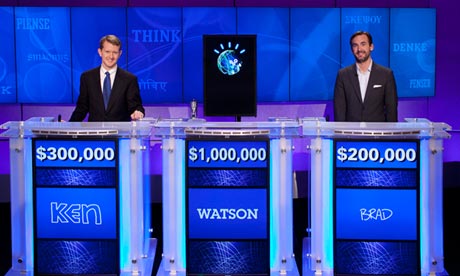Tasks that both humans and automated machines both can do will be left completely to the latter soon enough. We just can’t compete. But I don’t think that means these robots are truly Artificial Intelligence. I agree with Douglas Hofstadter about that. Scientists Miles Brundage and Joanna Bryson completely disagree with this line of thinking, arguing that IBM’s Watson, the second most interesting Jeopardy! champ, is indeed true AI. The opening of their article at Slate on the topic:
“Artificial intelligence is here now. This doesn’t mean that Cylons disguised as humans have infiltrated our societies, or that the processors behind one of the search engines have become sentient and are now making their own plans for world domination. But denying the presence of AI in our society not only takes away from the achievements of science and commerce, but also runs the risk of complacency in a world where more and more of our actions and intentions are being analyzed and influenced by intelligent machines. Not everyone agrees with this way of looking at the issue, though.
Douglas Hofstadter, cognitive scientist and Pulitzer Prize-winning author of Gödel, Escher, Bach, recently claimed that IBM’s Jeopardy! champion AI system Watson is not real artificial intelligence. Watson, he says, is ‘just a text search algorithm connected to a database, just like Google search. It doesn’t understand what it’s reading.’ This is wrong in at least two ways fundamental to what it means to be intelligent. First, although Watson includes many forms of text search, it is first and foremost a system capable of responding appropriately in real-time to new inputs. It competed against humans to ring the buzzer first, and Watson couldn’t ring the buzzer until it was confident it had constructed the right sentence. And, in fact, the humans quite often beat Watson to the buzzer even when Watson was on the right track. Watson works by choosing candidate responses, then devoting its processors to several of them at the same time, exploring archived material for further evidence of the quality of the answer. Candidates can be discarded and new ones selected. IBM is currently applying this general question-answering approach to real-world domains like health care and retail.
This is very much how primate brains (like ours) work.”


